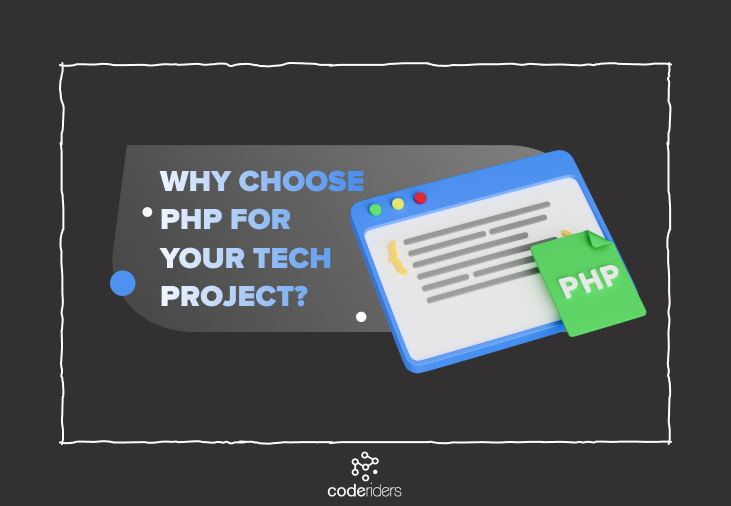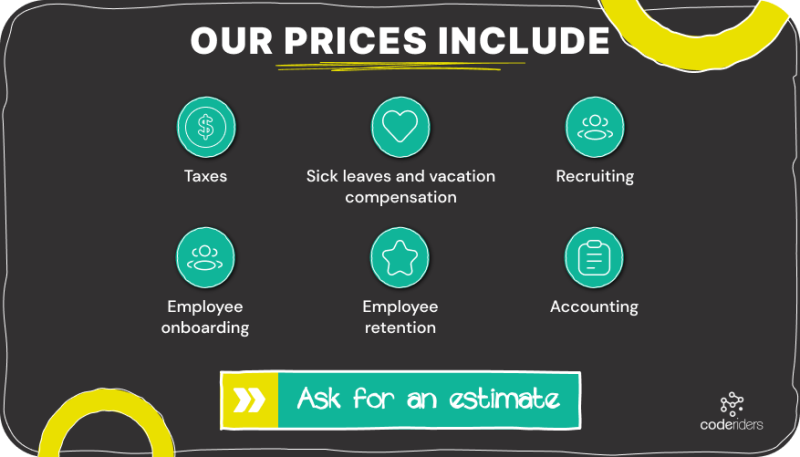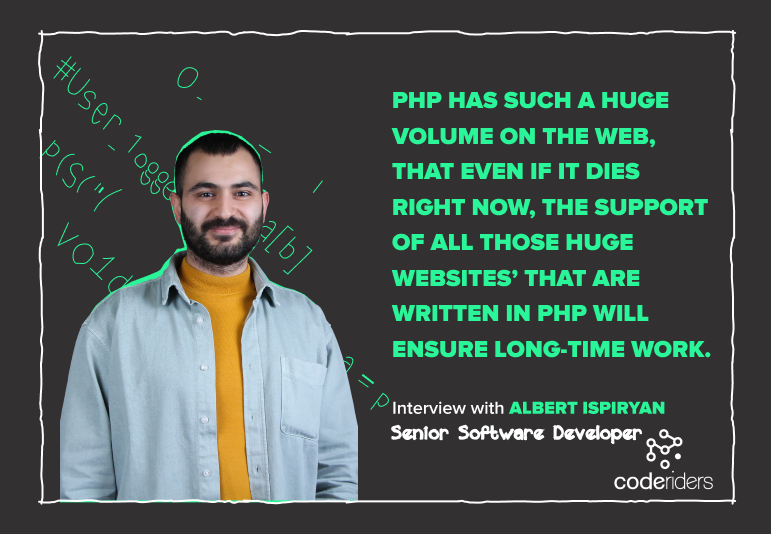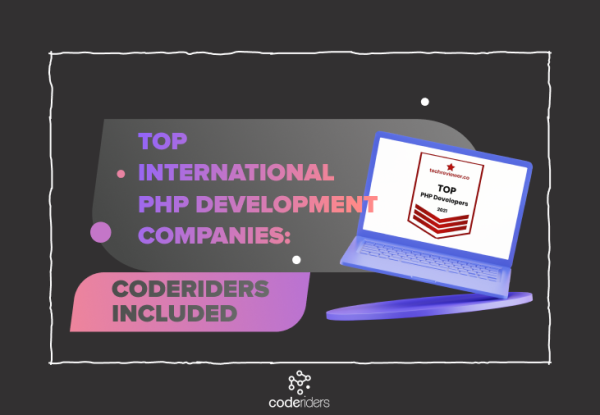PHP (Hypertext Preprocessor) programming language has been one of the most highly needed and popular programming languages since its creation date, 1994. So, what is the secret of the longevity of PHP in the international ICLT industry? Why does PHP never die? Why were the world’s leading websites developed in PHP programming language, and why did they include it in their main tech stack ever since? Why do an increasing number of businesses hire dedicated PHP programmers and Laravel developers? Will PHP development stay so popular in the upcoming years as well?
Legends have been circulating about this programming language for decades, and people still long for answers. Let's start from the beginning.
Subscribe to Newsletters
The history of PHP
PHP programming language was conceived in the fall of 1994 by Rasmus Lerdorf. Initially, they used its non-released versions to track the online resume viewers of Lerdorf. Eventually, PHP first version became available for public use one year later, in early 1995. Back then, it was known as The Personnel Homepage Tools. It had a simple parcel engine that understood a limited number of macros and utilities, which were in the wide use of homepages at that time, for instance, guest books, counters, and other similar things.
In mid-1995, the 2nd version of The Personnel Homepage Tools was released with the name PHP/FI version 2. It worked in combination with the Form Interpreter, plus mSQL support. The FI came from another package that interpreted HTML form data.
The new version of PHP grew at a tremendous pace. People seemed to love it and started contributing code to it. It fueled its further success, and by 1997, the parser was rewritten by Zeev Suraski and Andi Gutmans from scratch, forming the basis of the PHP version 3, which gave the start of something incredible.
PHP Now
Today PHP is a back-end general-purpose scripting language that we use to develop dynamic and interactive websites and web applications. Businesses use PHP development to manage databases, session tracking, build complete e-commerce websites, ERP software solutions, and so much more.
PHP is one of those first server-side languages embedded into HTML. It facilitates the process of adding new functionalities to web pages without calling external files for data.
PHP is also compatible with many popular databases such as MySQL, PostgreSQL, Oracle, and Microsoft SQL Server.
Main Functions of PHP include:
- Creating easily updatable dynamic page content,
- Creating, opening, reading, writing, and terminating files on the server,
- Opportunity for form data collection,
- Sending and receiving cookies,
- Controlling user access,
- Encrypting sensitive user data.
Thanks to these incredible opportunities, many companies from different industries hire dedicated PHP programmers.
According to W3Techs, 78.9% of all websites use PHP with a known server-side programming language. So, it turns out, about 8 out of 10 websites use PHP in one way or another. In other words, PHP is so extremely popular on the Internet that even if it dies now, the support of all those big websites developed in PHP will ensure its long-time work and influence.
SimilarTech statistics distinguishes the following countries where PHP has tremendous popularity.
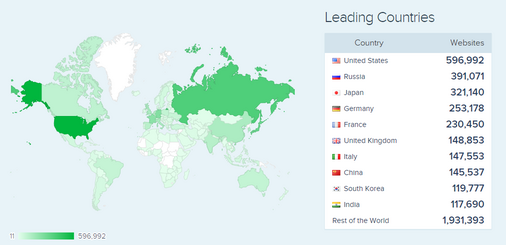
Source: SimilarTech
USA, Russia, Japan, Germany, and France are in the top 5, followed by Italy, China, South Korea, and India.
As a software outsourcing company providing qualified PHP developers, we at CodeRiders frequently get questions about the effectiveness of PHP development.
It is all simple. The effectiveness of PHP depends on its correct usage. This programming language works the best if you use it for its primary purpose - writing websites and applications.
Programmers About PHP Development
“If you ever have had a bad experience with PHP, first of all, ask yourself “What did I build with this language?”.On the other hand, if you need multiple web and mobile applications or custom software solutions, it is more appropriate to use Python, which has a wider field of usage. Python is also useful in big data analysis, machine learning, AI, etc. You may ask me a question here, “Then why should I use PHP in the first place when there is another technology used for multiple purposes?” Well, it is about comfort. PHP is not a typed language; you will meet fewer barriers while working with PHP. Plus, it is faster both for the users and developers. Recently, PHP 8 JIT Compiler was released giving a powerful speed boost.”
Albert Ispiryan, Senior back-end software developer at CodeRiders
PHP Frameworks
PHP frameworks come in a variety of types. The most popular PHP frameworks are:
- Laravel,
- Symfony,
- Zend,
- Yii,
- CodeIgniter.
Thus, it is natural that many business owners who require new PHP software solutions stumble upon the tough decision of choosing the appropriate PHP framework. All these frameworks are open-source and do not require any licensing fees. Some of these PHP frameworks fall into the full-stack web frameworks category, while others are micro-frameworks. Most of them follow the Model View Controller (MVC) design pattern that separates data manipulation from its presentation.
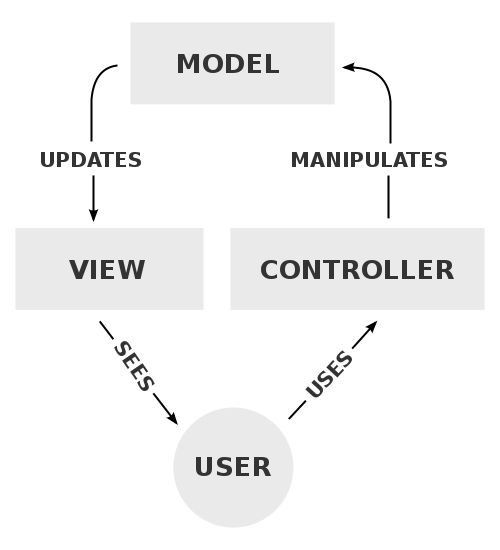
Model View Controller Process (source: Wikimedia Commons)
The MVC process is simple. The Model stores the business logic and application data to the View (the presentation layer). The User interacts with the View and can input instructions via the Controller. The Controller gives these commands to the Model, and the cycle continues. In short, the Model is about data, the View is about appearance, and the Controller is about behavior.
Laravel: The Most Popular and Demanded PHP Framework
Laravel (launched in 2011) has become the most popular PHP framework because it can securely handle complex applications and facilitate rapid application development. It has an expressive and elegant syntax. It simplifies and accelerates similar tasks of web projects, such as authentication, routing, sessions, coaching. It has clean architecture and is composer-friendly.
These advantages of Laravel push business owners or company leaders to hire Laravel developers for their complex projects. At CodeRiders, we lean on these advantages and strive to provide the most qualified dedicated Laravel programmers.
Some of our successful Laravel projects include:
Product: Real Estate Application (Online platform for franchisors and franchisees)
Tech stack: Laravel 5.8 for back-end, Vue.js for front-end
Country: Denmark
Product: Online platform for landlords and tenants
Tech stack: Laravel 5.8 for back-end, Vue.js for front-end
Country: The South African Republic
Product: PHP-based web application development for a marketing company
Tech stack: Vue.js 2.6 for front-end, Laravel 5.8 for back-end
Country: China
Check out the complete descriptions of these projects in an interview with our senior software developer Albert Ispiryan, and check our portfolio section for client reviews.
get to know our team and software solutions
To learn more about other PHP frameworks, such as Symphony, Zend, CodeIgniter, Yii, I suggest checking our article about Top Programming Languages That Will Define Coding.
Main Advantages of PHP
PHP is viral as long as there are websites
Some programming languages are strictly associated with specific software solutions. For example, when we talk about Machine learning (ML) or Artificial Intelligence (AI), we stop on Python. The same happens when you want to build a scalable and fast website, you simply pick up PHP development as your go-to choice.
PHP has low development costs
PHP has been around since 1994, and it has created its own identity. As it is an open-source server-side programming language, you can reduce the development costs marginally during the PHP development process.
However, the PHP development prices also vary significantly based on specific countries. For example, in Canada, according to Talent.com, the yearly salary of an average PHP developer lies between $80.000 - $100.000. In Australia, the annual salary for a PHP web developer varies between $90.000 to $110.000. We have similar numbers in European countries and USA, while in Armenia, you can hire dedicated PHP programmers with the same skill-set with a $30-$50 hourly rate. Check out more details about PHP web developer rates.
PHP is secure
PHP is as secure as any other server-side language. The vulnerability of the code or insecurity is up to the people who write it, not the language or tools.
PHP has a big community
Due to its long history and popularity, PHP has developed a strong community throughout the years. The number of PHP developers is significantly high. Almost 50% of inquiries we receive are about the availability of PHP engineers.
Famous Websites Developed in PHP / Use PHP
The world’s widely used social media platform, Facebook (Meta), is among the top websites developed in PHP. Its initial programming language was PHP, written in 2004 by its founders, Mark Zuckerberg and Dustin Moskowitz. Since its foundation, Facebook has been relying on one of the advantages of PHP, which is generating dynamic content in mere seconds. So, most of the application code on Facebook uses PHP.
At Facebook, the usage of PHP has been unchanged throughout its long history and enlargement. 2.895 billion monthly active users of Facebook and 1.3 billion monthly active users of Facebook messenger encourage and inspire a variety of modern companies to use PHP for their primary application code.
In general, the Facebook platform is a combination of APIs that make the app more social. This repository contains the open-source PHP SDK that accesses your Facebook account from the PHP app.
Facebook business SDK also uses PHP. That is a toolkit bundling business-focused APIs into one SDK, including Business Manager, Marketing, Pages, and the Instagram Graph API. Facebook business SDK allows managing campaigns for pages and accounts, marketing activities to prompt your business, such as ads creation and spreading, adding products, insights, permission controls, and more. PHP programming language supports all this.
In 2010, Facebook also introduced HipHop for PHP (HPHPc). This compiler translates the source code into the source code of another language.
Subscribe to Newsletters
Wikipedia
MediaWiki is free and open-source software developed in 2002 to power Wikipedia. Initially, the intention to create MediaWiki was to run Wikipedia. It uses PHP running on a MySQL database. MediaWiki remains in use by almost all other Wikimedia platforms, such as Wiktionary, Wikimedia Commons, and Wikidata.
MediaWiki was initially written in PHP programming language and stores all text content into a database. This platform is one of the largest websites in the world with high scalability and internationalization (available in more than 300 languages), proving the effectiveness of PHP programming language that is “simple to work with” for developers and easiness and convenience working with other languages and databases.
Other important programming languages include JavaScript for many essential components of MediaWiki such as VisualEditor, Persoid, and all Gadgets. Python language is widespread for developing tools like Pywikibot, while Ruby is the base language for the browser test engine (Cucumber) as well as is popular in the Puppet deployment system.
Compared to Facebook, in 2014, they switched to HHVM, accelerating the loading time for the page data.
Tumblr
One of the world’s most famous microblogging and social networking website, Tumblr, was founded in 2007 by David Karp. Its former and first CTO is Marco Arment, who wrote Tumblr, Instapaper, and Second Crack in PHP. According to Arment, it is perfectly possible to write good PHP code. He says:
“Tumblr, Instapaper, and some of our old consulting clients use a great PHP-5-only MVC framework that we've written over the last four years, which puts us in a great position: we have the advantages of knowing what all of the code does and where to fix bugs or add features, but we also have this mature, proven framework to do the heavy lifting and enforce good code structure.”
In 2016, Tumblr transitioned to PHP7, creating new language features for implementation, including scalar type hints and return type declarations. Tumblr community currently has over 555 million monthly visitors and has generated over 325 million blogs.
Slack
One of the most popular and in-demand workplace communication tools, a single place for messaging, tools, and files - Slack is initially written in JavaScript, Electron, C++, and Hack. For the server-side application logic, Slack uses PHP, which is a bit uncommon. However, the $20+ billion valued viral CMS system confirms that PHP provides better support for building, changing, and operating a successful project than other competing environments.
Perhaps, these and many other likewise PHP advantages pushed Slack to use this programming language. Slack currently has more than 10 million daily active users who spend on average 9 hours each day on the platform. To this extent, the paid version is popular as well. It has over 3 million subscribers. According to Slack user stats, over 43% of Fortune 100 businesses use the paid version of Slack.
Currently, Slack actively hires PHP developers along with the above-enumerated websites.
WordPress
The world’s most popular, in-demand, widely used, and free open-source content management system, WordPress, was written in PHP and is paired with a MySQL and MariaDB database. WordPress still uses PHP to interact with databases and fetch data.
PHP helps fetch essential components from the database and output them as static HTML. It allows millions of daily users with no programming skills to create and use templates, drag and drop website UI components, etc.
WordPress uses PHP for its core files. It includes a handful of functions, hooks, classes, and methods that can use both programmers and ordinary users to extend WordPress functionality in many helpful ways.
How is PHP used in WordPress?
Download the latest copy of WordPress from WordPress.org, open the ZIP file, and you will see that most of the included core WordPress files are PHP. Ultimately, all the themes and plugins that you install will contain a significant amount of PHP files.
Example:
In the ZIP file, you’ll find such separate PHP files as:
- Sidebar.php
- Header.php
- Comments.php, etc.
Each of these files connects to the similarly named area on the front end of your site:
Such as sidebar.php dictates how your sidebar area looks and functions, header.php dictates how your header looks and functions, while comments.php will dictate how your comments section will look and function.
The Future of PHP
PHP has come a long way from its roots as a template parsing system that would run C functions as it encountered tags. PHP is far away from being a dead language. The latest version of PHP (8.0) offers full object-oriented capabilities, an opt-in strict typing system, JIT compiler, database extensions, robust data, time processing tools, and more.
These improvements and capabilities prove that PHP is up to thriving. PHP will be in-demand in the future to continue powering CMSs (content management systems), e-commerce, CRMs (customer relationship management systems), source management systems, ERP systems (enterprise resource planning systems), and more.
APIs feeding mobile applications and business communication will still rely on PHP.
The new features in PHP 8 will help increase employee productivity, decrease maintenance, and improve performance (JIT). JIT compiler has the potential of providing inroads into system programming and machine learning.
We expect the PHP ecosystem to diversify much more in the future. There will be gaining traction for testing tools and automation. Companies will increase the usage of containers to deploy applications.
Final Thoughts
In conclusion, PHP is a programming language with history and rich expertise. It has seen significant ups and downs, and yet, it is still much competitive in the ICT industry. PHP backs up leading social platforms and open-source software solutions, recording magnificent successes.
International business owners and leaders still hire dedicated PHP programmers and rely on PHP development. PHP is here to stay!
Having
development
needs?
CodeRiders will address your web and mobile development challenges by creating custom software, helping with outsourcing services, or just consulting on your software development requirements.



